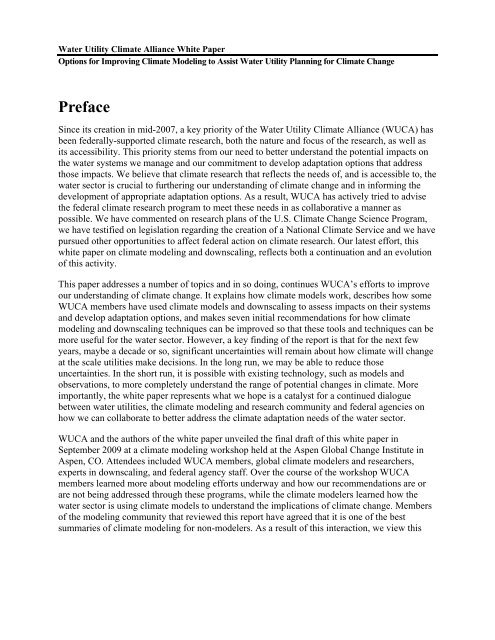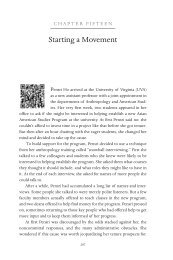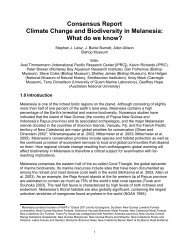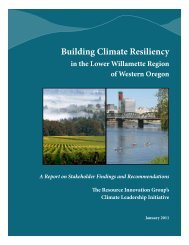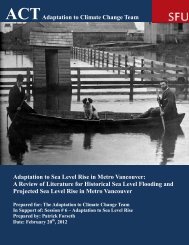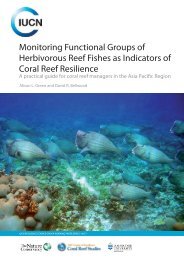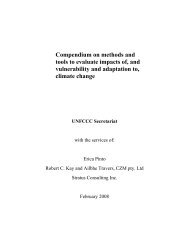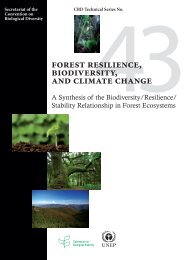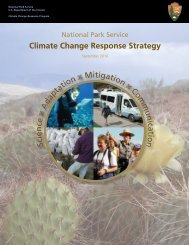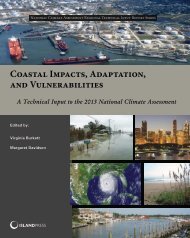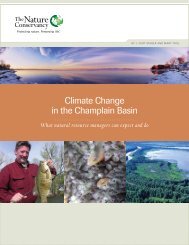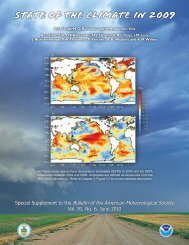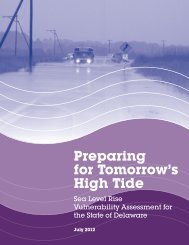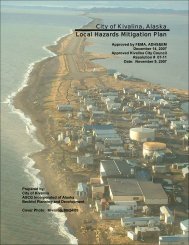Options for Improving Climate Modeling to Assist Water Utility ...
Options for Improving Climate Modeling to Assist Water Utility ...
Options for Improving Climate Modeling to Assist Water Utility ...
Create successful ePaper yourself
Turn your PDF publications into a flip-book with our unique Google optimized e-Paper software.
<strong>Water</strong> <strong>Utility</strong> <strong>Climate</strong> Alliance White Paper<br />
<strong>Options</strong> <strong>for</strong> <strong>Improving</strong> <strong>Climate</strong> <strong>Modeling</strong> <strong>to</strong> <strong>Assist</strong> <strong>Water</strong> <strong>Utility</strong> Planning <strong>for</strong> <strong>Climate</strong> Change<br />
Preface<br />
Since its creation in mid-2007, a key priority of the <strong>Water</strong> <strong>Utility</strong> <strong>Climate</strong> Alliance (WUCA) has<br />
been federally-supported climate research, both the nature and focus of the research, as well as<br />
its accessibility. This priority stems from our need <strong>to</strong> better understand the potential impacts on<br />
the water systems we manage and our commitment <strong>to</strong> develop adaptation options that address<br />
those impacts. We believe that climate research that reflects the needs of, and is accessible <strong>to</strong>, the<br />
water sec<strong>to</strong>r is crucial <strong>to</strong> furthering our understanding of climate change and in in<strong>for</strong>ming the<br />
development of appropriate adaptation options. As a result, WUCA has actively tried <strong>to</strong> advise<br />
the federal climate research program <strong>to</strong> meet these needs in as collaborative a manner as<br />
possible. We have commented on research plans of the U.S. <strong>Climate</strong> Change Science Program,<br />
we have testified on legislation regarding the creation of a National <strong>Climate</strong> Service and we have<br />
pursued other opportunities <strong>to</strong> affect federal action on climate research. Our latest ef<strong>for</strong>t, this<br />
white paper on climate modeling and downscaling, reflects both a continuation and an evolution<br />
of this activity.<br />
This paper addresses a number of <strong>to</strong>pics and in so doing, continues WUCA’s ef<strong>for</strong>ts <strong>to</strong> improve<br />
our understanding of climate change. It explains how climate models work, describes how some<br />
WUCA members have used climate models and downscaling <strong>to</strong> assess impacts on their systems<br />
and develop adaptation options, and makes seven initial recommendations <strong>for</strong> how climate<br />
modeling and downscaling techniques can be improved so that these <strong>to</strong>ols and techniques can be<br />
more useful <strong>for</strong> the water sec<strong>to</strong>r. However, a key finding of the report is that <strong>for</strong> the next few<br />
years, maybe a decade or so, significant uncertainties will remain about how climate will change<br />
at the scale utilities make decisions. In the long run, we may be able <strong>to</strong> reduce those<br />
uncertainties. In the short run, it is possible with existing technology, such as models and<br />
observations, <strong>to</strong> more completely understand the range of potential changes in climate. More<br />
importantly, the white paper represents what we hope is a catalyst <strong>for</strong> a continued dialogue<br />
between water utilities, the climate modeling and research community and federal agencies on<br />
how we can collaborate <strong>to</strong> better address the climate adaptation needs of the water sec<strong>to</strong>r.<br />
WUCA and the authors of the white paper unveiled the final draft of this white paper in<br />
September 2009 at a climate modeling workshop held at the Aspen Global Change Institute in<br />
Aspen, CO. Attendees included WUCA members, global climate modelers and researchers,<br />
experts in downscaling, and federal agency staff. Over the course of the workshop WUCA<br />
members learned more about modeling ef<strong>for</strong>ts underway and how our recommendations are or<br />
are not being addressed through these programs, while the climate modelers learned how the<br />
water sec<strong>to</strong>r is using climate models <strong>to</strong> understand the implications of climate change. Members<br />
of the modeling community that reviewed this report have agreed that it is one of the best<br />
summaries of climate modeling <strong>for</strong> non-modelers. As a result of this interaction, we view this


